Life Dimitra
Project number: 101113253 Project name: Valorising anaerobic digestates into bio-fertilisers for climate friendly agriculture Project acronym: LIFE22-CCM-EL-DIMITRA Project starting date: 1 September 2023 Project duration: 56 months
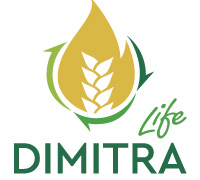
LIFE DIMITRA
The Project
LIFE DIMITRA (click photo for Homepage) aims to achieve a harmonious synergy of benefits, by pushing the boundaries of the current state-of-the-art in sustainable digestate valorization and management and promoting the diffusion and adoption of low-carbon technologies for biogas digestate. The outcomes include positive impacts on climate change mitigation, increased crop yields, and enhanced farm profitability. Through these advancements, LIFE DIMITRA strives to establish a more resilient and environmentally friendly approach to the entire biogas production cycle, aligning with broader goals of sustainable agriculture and resource management.
Read More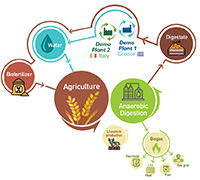
LIFE DIMITRA
Ambition
LIFE DIMITRA is expected to stand as an ambitious and very promising project in promoting climate mitigation in the land sector. It will significantly contribute to the reduction of GHG emissions because raw digestate storage and application on land will be avoided and mineral fertilisers will be substituted by innovative bio-based fertilisers. LIFE DIMITRA will demonstrate a transformative impact which will contribute to the shift towards a resource-efficient low carbon economy, producing biobased fertilisers advantageous both in circularity and GHG emissions terms.
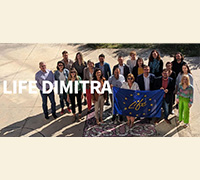
LIFE DIMITRA
About
Biogas serves as a crucial solution in addressing global warming and reducing dependence on non-sustainable energy resources. Despite its environmental benefits, the production of biogas generates significant volumes of digestate as a by-product, primarily utilized as fertilizer in agricultural fields. However, this practice poses notable environmental challenges, including greenhouse gas emissions, water pollution, and solid contamination. In response to these issues, the LIFE DIMITRA is dedicated to enhancing the sustainability of agricultural management practices. The focus is on valorizing biogas digestate to create higher-value bio-based fertilizers.
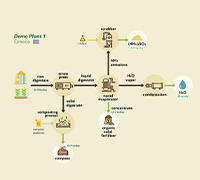
DEMO PLANTS
DEMO1 Greece
DEMO 1, located in Thiva,Viotia, Region (Greece), is connected to an existing anaerobic digestion plant with a capacity of 480 kW. This plant utilizes agricultural residues from various cultivations and manure as feedstock, employing a sustainable approach to energy production. The first step in the process involves the mechanical separation of the entire digestate using a cost-effective screw press. This method boasts lower capital and operational expenses, as well as reduced energy consumption (0.2-0.6 kWh/m3) in contrast to more energy-intensive solid/liquid separation methods, such as decanters and belt filter presses. The liquid fraction, enriched with ammoniacal nitrogen, undergoes further processing using a LOW-TEMPERATURE EVAPORATOR patented prototype separating system developed by MADISI (WO2010/045892 A1).
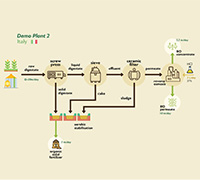
DEMO PLANTS
DEMO2 Italy
DEMO 2, situated in Isola della Scala, Veneto Region (Italy), collaborates with an existing anaerobic digestion of 1000 kW capacity (Fig. 6). DEMO 2 is designed to optimize the management of digestate derived from a mix of manure and energy crops, introducing innovative processes for enhanced resource recovery and sustainable agricultural practices. Within the existing plant, the digestate undergoes an initial mechanical separation through a screw press, resulting in distinct liquid and solid fractions. The liquid fraction undergoes further refinement through a sieving process, followed by treatment in a ceramic filter. This step ensures the reduction of suspended solids, enhancing the quality of the liquid stream. The clarified liquid from the ceramic filter undergoes an advanced reverse osmosis (RO) process.
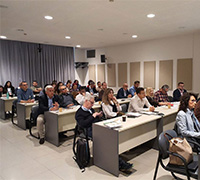
LIFE DIMITRA
Objectives
LIFE DIMITRA aspires to achieve high GHG emissions savings and mitigate nitrogen losses from the efficient conversion of digestate into high quality bio-based fertilisers and the substitution of fossil mineral fertilisers, thus also fostering the principles of cascading use of digestate for the recycling of its nutrients. A significant decrease of GHG emissions from biogas digestate management is targeted, by enhancing digestate properties, developing new fertilising formulations from digestate, improving nutrient use efficiency for fertilisation and reducing the dependence on on-site land application. Apart from fertilisers, clean water is recovered, which can be used on-site or for irrigation purposes. Digestate valorisation will also lead to reduction of GHG emissions related to the storage and transportation of large volumes of raw digestate.
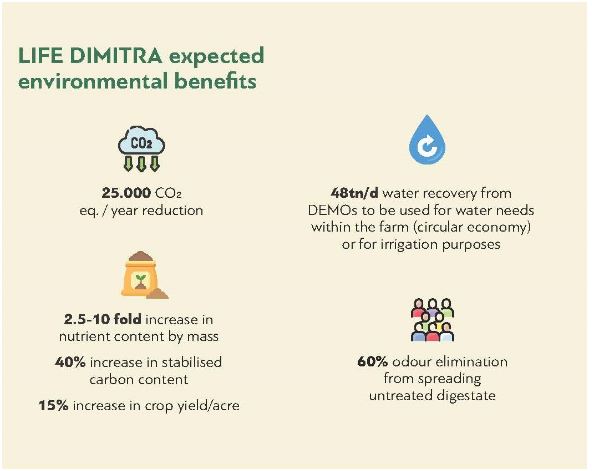
LIFE DIMITRA
Impact & Expected Results
LIFE DIMITRA is expected to stand as an ambitious and very promising project in promoting climate mitigation in the land sector. It will significantly contribute to the reduction of GHG emissions because raw digestate storage and application on land will be avoided and mineral fertilisers will be substituted by innovative bio-based fertilisers. The latter will ensure improved GHG sequestration due to the stabilization of organic matter and the improvement of carbon to nutrients ratios that are achieved via the application of the proposed technological schemes. Additionally, LIFE DIMITRA will demonstrate a transformative impact which will contribute to the shift towards a resource-efficient low carbon economy, producing biobased fertilisers advantageous both in circularity and GHG emissions terms.








